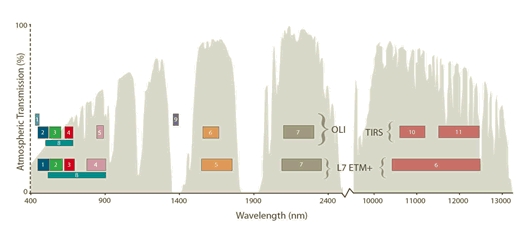Thermal Infra-Red Sensor (TIRS)
About TIRS
The Landsat Thermal Infra-Red Sensor (TIRS) provides two more narrow spectral bands in the Thermal (originally covered by a single band in the previous TM and ETM+ sensors) and is a QWIP (Quantum Well Infra-Red Photodetector) based instrument intended to supplement the observations of the OLI instrument.
The Thermal Infra-Red Sensor instrument, on board Landsat-8, is a thermal imager operating in pushbroom mode with two Infra-Red channels: 10.8 µm and 12 µm. The two spectral bands are achieved through interference filters that cover the FPA (Focal Plane Assembly). The pushbroom implementation increases the system sensitivity by allowing longer integration times than whiskbroom sensors. The two channels allow the use of the "split-window" technique to aid in distinguishing between the temperature of the Earth's surface and that of the atmosphere.
| Swath Width | 185 km |
| Spatial Resolution (GSD) | 100 m |
| Scene Size | 185x180 km |
| Bandwidths | 10.3-11.3 µm (10.8 band centre) and 11.5-12.5 µm (12.0 band centre) |
Landsat bands
Find out more about TIRS on the NASA website
Data Description
ESA offers to registered users the access through the Landsat-8 portal to the following data collections:
Further information can be found on the Products Information page.
TIRS Cal/Val
The goal of TIRS calibration and validation activities is to verify the accuracy and quality of data the instrument acquires.
TIRS Quality Control Reports
Quality Control Reports are available for TIRS in three different varieties covering quality monitoring, data unavailability and any product anomalies.